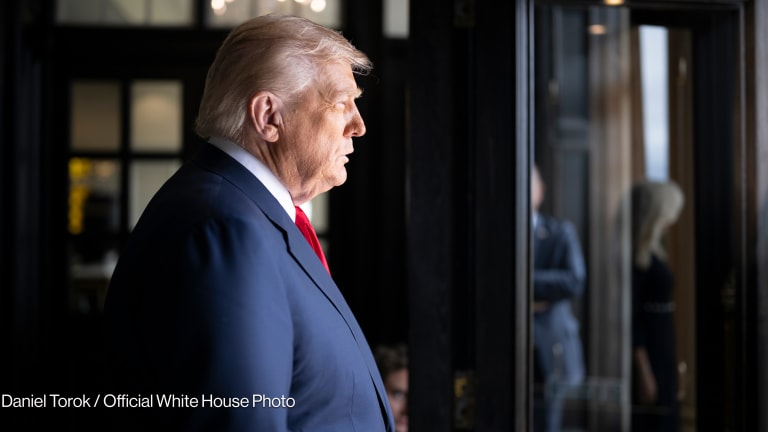US government misses foreign aid accountability deadline as shutdown continues

WASHINGTON — As the U.S. federal government remains shut down, the Trump administration has missed a deadline of congressional oversight on the implementation status of foreign aid transparency requirements.
The Office of Management and Budget has yet to respond to a Dec. 13 letter sent by a bipartisan group of senators and representatives requesting information about administration progress to comply with the 2016 Foreign Aid Transparency and Accountability Act. The lead authors of the letter were Democratic Rep. Gerry Connolly of Virginia, and former Republican Rep. Ted Poe, who retired from Congress earlier this month.
Let’s have uniform data so we’re all singing from the same hymnal. We could all make different conclusions about what that data means, but to have different sets of data ... in no way is in the spirit of our bill.”
— Democratic Rep. Gerry Connolly of VirginiaThe letter requested a response and a briefing from OMB including “an assessment of progress made to date, a detailed timeline for completing all outstanding elements, and what congressional action, if any, would assist with implementation and the goal of greater transparency and accountability,” by Jan. 12. The government shutdown began on Dec. 21.
“We’re disconcerted by the fact that OMB so far has ignored the law” and its compliance obligations under the act, Connolly told Devex. “I have received no communications that I’m aware of from OMB with respect to implementation or our December letter.”
Republican Rep. Ted Yoho of Florida, another signatory of the letter, also said his office had received no response from OMB.
“We’re going to have to wait until we get through this nonsense,” Yoho told Devex, referencing the shutdown.
How is the US government shutdown impacting development?
The partial shutdown of the U.S. government, now in its 26th day, means that many of the government staff working on aid are furloughed.
Connolly said now that Democrats have taken control of the House of Representatives, he hopes to hold a congressional hearing to learn why various entities have not complied with their obligations under the act. Yoho said he would support a hearing to examine how compliance with the act can help U.S. agencies increase aid effectiveness, but would not support a hearing conducted just “to attack the administration.”
OMB did not respond to multiple requests for comment regarding implementation and the delay in response to Congress.
The Foreign Aid Transparency and Accountability Act requires the president to establish monitoring and evaluation plans for U.S. foreign aid programs, with guidelines on performance metrics and measurable goals. It also mandates the reconciliation of multiple U.S. foreign assistance dashboards maintained by the U.S. Agency for International Development and the U.S. State Department. The bill passed in 2016 with support from both parties and formalized some Obama administration initiatives surrounding aid effectiveness.
“The importance of the FATAA bill was to institutionalize in law, beyond just a specific administration, the requirement that U.S. assistance be transparent and that it be monitored and effectively evaluated,” said Modernizing Foreign Assistance Network co-chair George Ingram.
The bill required the president to establish monitoring and evaluation guidelines within 18 months of passage — a deadline the Trump administration met in January 2018. At that time, OMB gave all U.S. agencies with foreign assistance responsibilities one year to publish department evaluation policies that adhere to the guidelines. In the letter, which was sent before the government shutdown began last month, members of Congress said they expected relevant agencies to meet the Jan. 11, 2019 deadline.
“What can we do to make this better? That was always the mission,” of the act, Yoho said.
The act mandates that the administration improve its foreign aid reporting and transparency. It requires agencies to make their spending available online so all U.S. foreign assistance spending is publicly available. The bill also requires the consolidation of USAID’s Foreign Aid Explorer and the State Department’s foreignassistance.gov aid spending dashboards.
More on US aid:
► What to watch in US Congress in 2019
► How policy wonks, politicos, and a conservative Republican remade US aid
► Q&A: A career spent advocating for effective US foreign assistance
“You could have multiple sites all having different data. Or different approaches to the data that could be confusing rather than illuminating,” Connolly said. “Let’s have uniform data so we’re all singing from the same hymnal. We could all make different conclusions about what that data means, but to have different sets of data — that might even be contradictory or certainly confusing — in no way is in the spirit of our bill.”
The administration was supposed to consolidate the aid databases by the end of 2018, a deadline it did not meet. The letter requested a full report from OMB on the status of this process.
Other signatories of the letter include Sen. Ben Cardin, a Democrat from Maryland; Sen. Chris Coons, a Democrat from Delaware; Sen. Marco Rubio, a Republican from Florida; Sen. Johnny Isakson, a Republican from Georgia; and Rep. Adam Smith, a Democrat from Washington. They write that “with better information about U.S. aid, decision-makers, taxpayers, partner countries, and civil society have a much clearer picture of where the U.S. is spending its money, for what purpose, and with what result.”
“At a time of growing international challenges,” Coons said in a statement to Devex, “congressional oversight of foreign assistance is vital to maximize the effectiveness of U.S. taxpayer dollars and guarantee that foreign assistance remains a pillar of U.S. engagement around the world.”
Search for articles
Most Read
- 1
- 2
- 3
- 4
- 5








